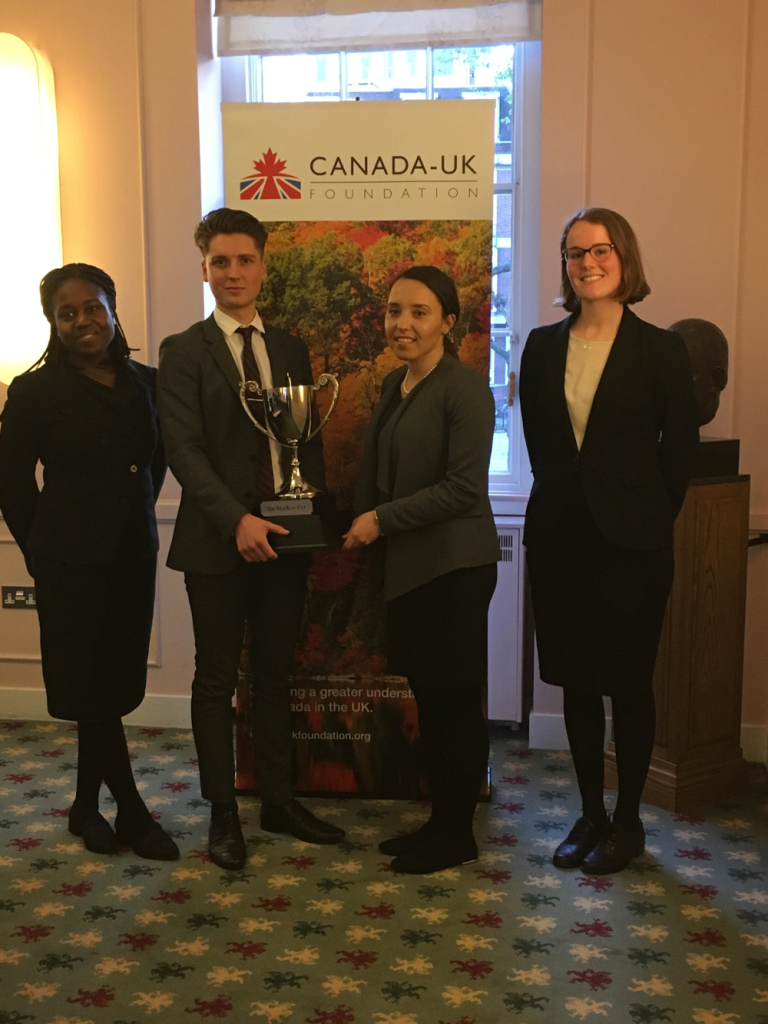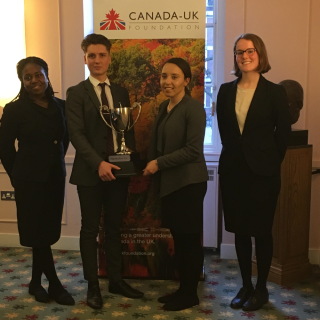The MacKay Cup Moot is the UK Canadian Law Competition hosted by the University of Leicester, endowed by the Former Canadian Minister for Justice, Peter MacKay, and supported by the Canada-UK Foundation. This year’s competition was sponsored by Baker MacKenzie and Sweet & Maxwell which donated prizes to the winning team. In this article, Dionne Boahene, a member of the City Law School team, tells us about her experiences in this unique competition…

As a Canadian studying law in the UK, I jumped at the chance to participate in the MacKay Cup Canadian Law Moot. My mooting partner, Flora Curtis, and I represented City against three other universities (Kent, Sussex, and Leicester). The moot problem was a constitutional claim concerning rights protected under the Charter of Rights and Freedoms. We were tasked with addressing two grounds: firstly, whether a police search had violated section 8 (protection against arbitrary search and seizure) and secondly, if section 8 had been violated, whether the evidence obtained should be excluded pursuant to subsection 24(2) (exclusion of evidence).
As a budding constitutional law enthusiast, I was intrigued by this moot problem. But, there are unique challenges involved in this competition for participants with little prior academic knowledge of Canadian law. (I searched the dusty corners of my mind for any remnants of knowledge from high school law classes, and all I came up with was the shocking realisation of how long ago high school was…)
 Firstly, I had to familiarise myself with a new set of legal databases. CANLII proved invaluable for case law, as did Lexum for accessing Supreme Court judgements. Both the Charter and the Criminal Code can be found on the Government of Canada website. Secondly, I had to learn the appropriate procedure and etiquette for a Canadian moot court. The prospect of writing a 12-page factum was an intimidating one for me, given that I was used to writing 2-page skeleton arguments for previous mooting competitions.
Firstly, I had to familiarise myself with a new set of legal databases. CANLII proved invaluable for case law, as did Lexum for accessing Supreme Court judgements. Both the Charter and the Criminal Code can be found on the Government of Canada website. Secondly, I had to learn the appropriate procedure and etiquette for a Canadian moot court. The prospect of writing a 12-page factum was an intimidating one for me, given that I was used to writing 2-page skeleton arguments for previous mooting competitions.
A skeleton argument, the standard for English courtrooms, outlines counsel’s submissions and authorities in brief. A factum is a much longer and more comprehensive document which includes a summary of the facts, a statement of the case, and the grounds of appeal in some detail. While Canadian moot court etiquette is unavoidably formal, it undoubtedly much less austere that a traditional English moot. I very happily discarded the ‘My Lady’s and ‘My Lord’s from my mooting vocabulary, and I can’t say I missed them.
As far as familiarising myself with the laws and legal processes of another jurisdiction, it was a manageable transition. The Canadian legal system is founded on both English common law and French civil law. English common law is the basis of many Canadian legal principles. For example, I relied on an English authority (R v Waterfield [1963]) for the test to determine whether the police officer had acted within his powers for the purposes of lawful detention and search incident to detention. This is a test that has been widely adopted by Canadian courts.
The MacKay Moot may be slightly less demanding that other external mooting competitions in the sense that there are only two rounds. However, the timing of the competition was less than opportune. The first round was held at the end of April and the final round at the beginning of May. This is right in thick of final research paper and exam study season for law students. Throw in part-time work or pro bono commitments and pupillage or training contract interviews and that makes for an over-stretched, over-stressed, and over-caffeinated law student. Therefore, I would say the biggest challenge was time management. For me, the key to making the most of the competition without letting it detract from the other commitments is the ability to synthesis large amounts of information, identify what is relevant to your submissions, and draw it out in such a way that advances and enhances your overall argument.
This is something that Flora and I must have done relatively well to make it past the first round. The first round was held at Gray’s Inn and judged by Fox Scholars and Ontario-qualified lawyers Scott Kerr and Alex Ognibene. The first round also brought me an impromptu reunion with a fellow alumna of my alma mater. In the nervous minutes before we began, I noticed that the lead counsel from the opposing team, the University of Leicester, looked familiar. I whispered: “Did you go to U of T?” She smiled. I smiled. “I knew I recognised you from St. Mike’s!”
City was one of two teams to make it to the final round where we faced the University of Sussex. Flora and I had to prepare the opposite side of the argument for this final round. It was not only intellectually challenging to conjure up a sufficient argument in direct opposition to the position I had spent the past couple weeks convincing myself of, but it was also organisationally challenging. There was only one week between the first and final rounds, a relatively short time-frame to prepare a new argument, familiarise ourselves with new authorities, draft a new factum, and compile a new e-bundle. However, these challenges paid off when we were aptly prepared to face the formidable judging panel which consisted of The Hon. Mr Justice Green of the High Court (appointed Chairman of the Law Commission on 1st August 2018), Noah Stewart-Ornstein from Kirkland & Ellis International LLP, and Dr Tracey Elliot, Lecturer in Health Law at the University of Leicester. The judges praised Flora for adeptly drawing their attention to the strongest points in her argument while skilfully knowing when to concede. They praised me for my strength in responding to judicial intervention. We came second in the competition overall and secured cash prizes.
 We closed the evening with a reception for participants, judges, and attendees. It was a small crowd which made for intimate networking – a great opportunity to speak to and learn from successful and experienced legal practitioners. Although, if I’m to be entirely honest, the real stars of the evening were the irresistible canapés on offer from Gray’s. There was a revolving service of trays, each one filled with some new delicate, delectable treat, and each time I could hardly control my excitement. (Back when I first started attending professional networking events, I resolved never to attend an event on an empty stomach because I risked focussing too little on the networking and too much on the food. I broke that rule on this occasion, and I regret nothing.)
We closed the evening with a reception for participants, judges, and attendees. It was a small crowd which made for intimate networking – a great opportunity to speak to and learn from successful and experienced legal practitioners. Although, if I’m to be entirely honest, the real stars of the evening were the irresistible canapés on offer from Gray’s. There was a revolving service of trays, each one filled with some new delicate, delectable treat, and each time I could hardly control my excitement. (Back when I first started attending professional networking events, I resolved never to attend an event on an empty stomach because I risked focussing too little on the networking and too much on the food. I broke that rule on this occasion, and I regret nothing.)
The MacKay Moot is a must-do for Canadian students in the UK and a great opportunity for students generally interested in the law of other jurisdictions.
If nothing else, I assure you it’s worth it for the canapés.*
*Disclaimer: This is not a legal representation.

